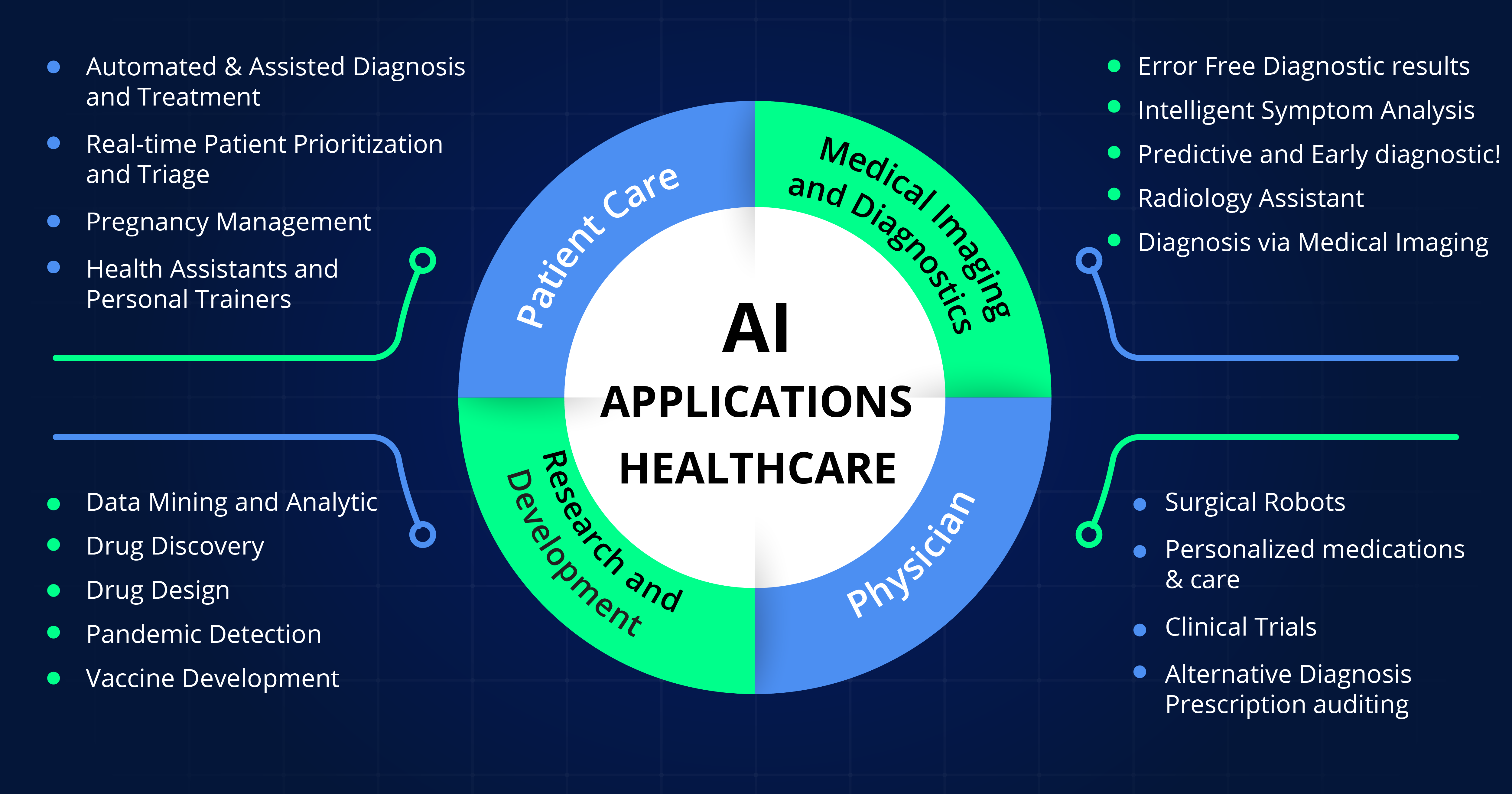Explore how AI-assisted diagnosis and treatment are revolutionizing healthcare. Discover the benefits of AI in improving accuracy, personalizing care, and enhancing patient outcomes, as well as the challenges and future prospects of integrating automation in healthcare.
The integration of automation into healthcare has ushered in new era of efficiency accuracy and potential for improved patient outcomes. Central to this transformation is use of artificial intelligence (AI) in diagnosis and treatment. AI technologies are increasingly being employed to assist healthcare professionals. They help in making more accurate diagnoses. They also personalize treatment plans and enhance overall patient care. This extensive exploration delves into impact of AI-assisted diagnosis and treatment. It examines benefits, challenges and future prospects
The Role of AI in Diagnosis
AI has become powerful tool in diagnostic process offering capabilities that extend beyond traditional methods. Machine learning algorithms, subset of AI are designed to analyze vast amounts of medical data including images and electronic health records and genetic information. These algorithms can identify patterns and anomalies that might be missed by human observers. This leads to earlier and more accurate diagnoses.
One of most notable applications of AI in diagnosis is in medical imaging. AI systems can interpret images from X-rays, MRIs and CT scans with high precision. For example AI algorithms have demonstrated ability to detect early signs of conditions such as cancer or fractures or neurological disorders. By analyzing imaging data, AI can assist radiologists in identifying abnormalities and suggesting potential diagnoses.
In addition to imaging AI is also used to analyze patient data from electronic health records. EHRs contain comprehensive information about patient’s medical history, symptoms and previous treatments. AI algorithms can process this data. They provide insights into potential diagnoses and recommend further diagnostic tests. This can lead to more personalized and accurate assessments. It improves patient outcomes.
AI-Assisted Treatment Planning
AI's impact extends beyond diagnosis into realm of treatment planning. Treatment plans are often complex. They require consideration of numerous factors. These include patient’s medical history current condition and potential responses to various therapies. AI can assist in creating more tailored treatment plans. It analyzes data from similar cases and predicts outcomes based on various treatment options.
For instance, in oncology AI algorithms can analyze genetic data from cancer patients to identify specific mutations. They suggest targeted therapies. This approach, known as precision medicine aims to customize treatment based on individual characteristics of each patient’s cancer. By leveraging AI, oncologists can develop more effective treatment strategies. They can minimize adverse effects.
AI can also play role in managing chronic diseases. For patients with conditions such as diabetes or heart disease AI-driven tools analyze real-time data from wearable devices or home monitoring systems. These tools provide recommendations for lifestyle adjustments. They also support medication adherence and other aspects of disease management. This proactive approach helps maintain better control over chronic conditions. It assists in preventing complications.
Enhancing Patient Care with AI
AI's role in enhancing patient care is multifaceted. It involves improved communication monitoring and support. Virtual health assistants and chatbots serve as examples of AI-driven tools. They can provide patients with timely information and support. These tools answer common medical questions. They can schedule appointments, provide reminders for medication adherence reducing burden on healthcare providers.
Moreover, AI assists in monitoring patient health through wearable devices and remote sensors. These technologies track vital signs activity levels and other health metrics in real-time. AI algorithms analyze this data. They detect early signs of potential issues. This alerts healthcare providers or patients to take appropriate actions. This continuous monitoring contributes to more proactive and personalized care.
Challenges and Limitations
Despite promising benefits of AI in healthcare there are several challenges and limitations to consider. One primary concern is quality and completeness of data used to train AI algorithms. AI systems rely on large datasets to learn and make predictions. If data is incomplete, biased or unrepresentative, it can lead to inaccurate or unfair outcomes.
Another challenge is integration of AI into existing healthcare workflows. Implementing AI tools requires changes in how healthcare professionals operate. There may be resistance to adopting new systems. Ensuring seamless integration with current practices is crucial for successful implementation.
Privacy and security of patient data are also significant concerns. AI systems often require access to sensitive health information which raises questions about data protection and confidentiality. Ensuring that AI technologies adhere to strict privacy standards is essential. Secure data handling practices are vital to maintaining patient trust.
Future Prospects of AI in Healthcare
The future of AI in healthcare holds exciting possibilities with ongoing advancements likely to drive further innovation. As AI technologies continue to evolve there will be opportunities for even more accurate and efficient diagnosis. Also, treatment could improve. For example integration of AI with genomics and personalized medicine is expected to revolutionize how diseases are understood and treated.
Development of AI-powered predictive analytics could further enhance preventive care. By analyzing data from diverse sources, AI could identify patterns. It could also predict risk of developing certain conditions before symptoms arise. This proactive approach has potential to improve overall health outcomes and reduce healthcare costs.
Additionally advancements in natural language processing and AI-driven decision support systems could enhance clinical decision-making. These systems could assist healthcare providers in evaluating complex cases. They could suggest treatment options and facilitate collaboration among multidisciplinary teams.
In conclusion automation in healthcare, particularly through AI-assisted diagnosis and treatment is transforming landscape of patient care. AI technologies offer potential for more accurate diagnoses. They also provide personalized treatment plans and enhanced patient monitoring. While there are challenges to address, including data quality integration and privacy concerns, future prospects of AI in healthcare are promising. As these technologies continue to advance they hold potential to significantly improve quality and efficiency of healthcare delivery. This ultimately benefits patients and healthcare providers alike
